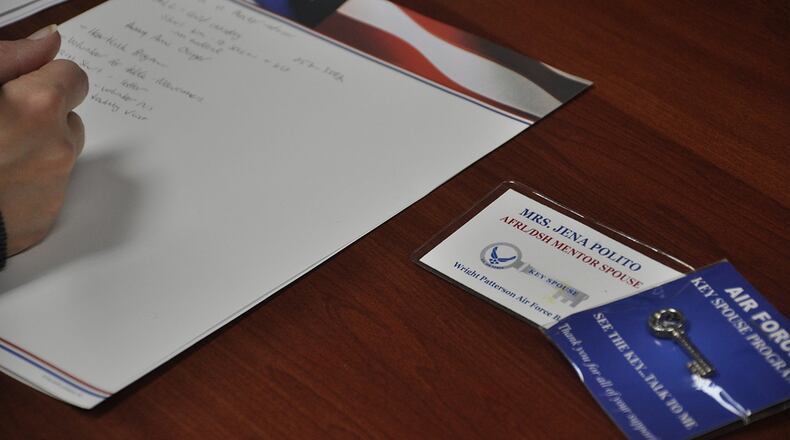Most of the time the mail comes in forms of care packages sent from Key Spouses from the members’ home units.
That is why Key Spouses are integral to the overall Air Force mission. Their purpose has been standardized across the Air Force to address the needs of all military families with special emphasis on support to families across the deployment cycle, according to U.S. Air Force Services Combat Support and Community Service.
Jacqueline Shazor, Airman & Family Readiness Key Spouse coordinator, recalled a time when a deployed member who had just returned from Djibouti, Africa, shared how her office won a “Best Christmas Tree” contest for being the most creative and by decorating the tree with care package items.
“The tree was made out of empty water bottles that they collected from around the camp and real holiday ornaments they received in care packages from their unit Key Spouses,” she said. “Sometimes, it’s [care packages] the only thing they look forward to – it makes them feel special because they are being thought of.”
Shazor stressed the importance of the role of Key Spouses in ensuring families are getting connected with essential information and support services. Sometimes families are more comfortable contacting the unit Key Spouse rather than their spouse’s supervisor or leadership. Key Spouses have extensive experience with the challenges that military dependents go through and can provide the needed information on resources.
Not only do Key Spouses serve as ongoing community connections during the deployment cycle, they also provide volunteer opportunities for spouses out in the community. They serve many purposes and may even function as an informal sounding board, she continued.
Air Force Instruction 36-3009 outlines the Key Spouse program as an official Air Force unit family readiness program designed to enhance mission readiness and resiliency and establish a sense of community.
The program is owned by unit commanders who set the goals and objectives for the program and assign key personnel for the team. Key Spouse volunteers can be military spouses or Department of Defense civilians and are trained annually.
Shazor recently held a class for Initial Key Spouse and Mentor training. Topics of discussion included available resources and services for programs under the Integrated Delivery System Team.
The team consists of the Chaplain Corps, Airman & Family Readiness, Family Advocacy, Military Family Life Consultants, Alcohol and Drug Abuse Prevention and Treatment, Mental Health, Sexual Assault Prevention Response, Employment Equal Opportunity, Civilian Health and Promotion Services, Employee Assistance Program, School Liaison Officer, Community Support Coordinator and the Family Readiness Program.
The following training dates are scheduled for 2019 (All times are 8:30 a.m. to 2:30 p.m.):
- Jan. 22
- March 27
- May 2
- Aug. 15
- Nov. 21
For more information on the Key Spouse program, contact the Airman & Family Readiness Center at 937-257-3592.
About the Author
